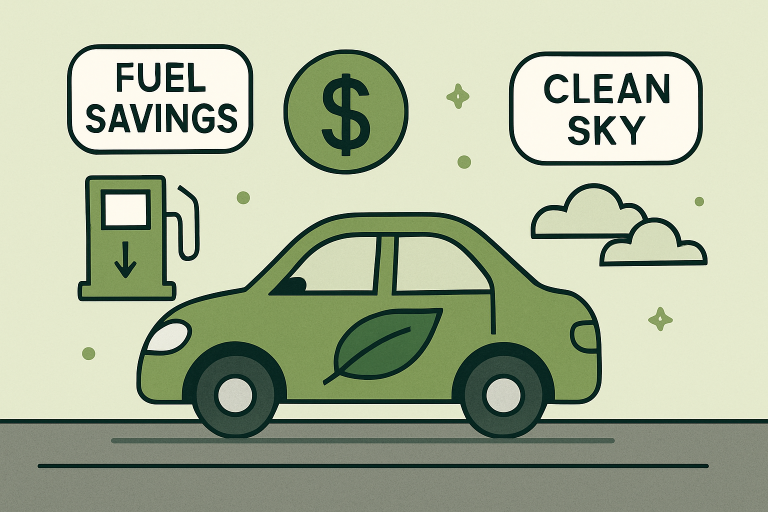Key Takeaways
- Fuel-efficient vehicles offer significant cost savings on fuel and maintenance, freeing up more of your budget for other priorities.
- They contribute to environmental conservation by reducing greenhouse gas emissions, critical in combating climate change.
- Government incentives can make purchasing fuel-efficient cars more affordable, helping offset the upfront costs of new technology.
- Advancements in technology have improved the performance and accessibility of fuel-efficient vehicles, meaning drivers don’t have to compromise on comfort, features, or reliability.
Economic Benefits of Fuel-Efficient Vehicles
Choosing a fuel-efficient vehicle can significantly boost your financial well-being, impacting your budget in ways that go beyond simple fuel savings. These cars are meticulously engineered to maximize mileage by extracting the most value from every drop of fuel, often incorporating cutting-edge engine designs, improved aerodynamics, and lighter materials. For drivers who commute regularly or rack up high mileage annually, owning a fuel-efficient car can translate into savings of several hundred, or even thousands, of dollars throughout the car’s lifespan. Over five or ten years, these savings can add up to a substantial amount, allowing owners to allocate their resources to other essentials such as family expenses, education, or retirement planning. The difference becomes apparent when comparing vehicles achieving 30 miles per gallon to those with much lower efficiency rates, as the cost per mile drops and the savings accumulate rapidly over time.
Aside from lower spending at the pump, many motorists find that fuel efficiency is matched by an overall reduction in ownership costs, adding value over the vehicle’s lifetime. The savings aren’t limited to gasoline but often extend to repair, maintenance, and sometimes insurance expenses. Fuel-efficient models are designed with simplicity, meaning that components designed to minimize friction or wear can also help reduce the frequency and severity of costly repairs. When evaluating new car options, it’s beneficial to consider the sticker price and ongoing operational costs. For those considering a vehicle upgrade or purchase, it helps to learn more about newer options that offer greater fuel economy and find a model suited to your driving habits and budget. This comprehensive approach ensures you make a sound financial decision that fits your lifestyle for years.
Environmental Impact: Reducing Carbon Footprint
One of the most persuasive reasons to switch to a fuel-efficient car is its substantial reduction in environmental impact. Transportation is a leading contributor to greenhouse gas emissions, accounting for nearly 28% of the total emissions in the United States, according to the Environmental Protection Agency. By emitting less carbon dioxide and other pollutants, fuel-efficient vehicles help mitigate climate change and improve air quality. This is especially crucial in densely populated urban areas, where automotive emissions play a larger role in smog and respiratory health challenges, amplifying risks for asthma, bronchitis, and cardiovascular issues. Reducing tailpipe emissions helps combat global warming and enhances the quality of the local environment for families and future generations.
Owners of fuel-efficient vehicles also contribute positively to conservation efforts by lowering demand for fossil fuels and reducing reliance on environmentally damaging extraction processes like drilling and fracking. With a global emphasis on sustainability, every car that reduces emissions and fuel consumption helps move society toward meeting broader environmental goals. This collective shift has broader implications, such as preserving natural habitats, protecting wildlife, and reducing economic vulnerability from oil price fluctuations. By making the switch, individuals become active participants in broader environmental stewardship efforts, supporting cleaner air and reduced noise pollution in their communities.
Government Incentives and Policies
Governments worldwide recognize the importance of reducing automotive emissions and promote fuel-efficient vehicles through various incentives. In the United States, buyers of specific electric and plug-in hybrid models can claim up to $7,500 in federal tax credits, depending on the vehicle’s battery size and manufacturing source, with additional rebates or perks available at the state and local levels. These incentives can make what may seem like a cost-prohibitive purchase far more affordable, especially when combined with manufacturers’ promotions or trade-in programs. Beyond direct financial incentives, policies encouraging green vehicle adoption may include cash rebates, tax exemptions, discounts on charging equipment, or added conveniences like preferred parking and HOV lane access in some locales. In some parts of the country, certain cities even offer free or subsidized charging at public infrastructure points, making it easier for electric and plug-in hybrid owners to go about their daily routines. By taking advantage of these programs, consumers can offset higher upfront costs and enjoy faster returns on their investment while contributing to a cleaner environment, transforming what was a luxury purchase into a practical financial choice for millions of drivers.
Technological Advancements in Fuel Efficiency
The automotive industry has seen remarkable innovations in fuel-saving technologies that have revolutionized how vehicles consume energy and reduce emissions. Hybrid and plug-in hybrid systems, turbocharged engines, direct-injection fuel technologies, and start-stop technology represent significant strides, empowering vehicles to use less fuel during idling or low-speed travel. Regenerative braking systems, for instance, efficiently capture and reuse kinetic energy that would otherwise go to waste during braking, redirecting it back to the battery. Hybrid drivetrains, meanwhile, allow seamless transitions between gasoline and electric operation, optimizing efficiency without sacrificing performance. In recent years, carmakers have also focused on refining aerodynamics, introducing shape-shifting body panels and underbody covers to minimize drag and boost highway mileage. Incorporating lightweight yet durable materials, such as aluminum or carbon fiber composites, further enhances fuel economy by lowering the engine’s overall mass to propel.
Many modern vehicles are equipped with real-time driving feedback systems, which encourage fuel-saving habits such as gentle acceleration, proper tire inflation, and reduced idling. These incremental improvements in hardware and software ensure that, regardless of driving habits, today’s fuel-efficient vehicles offer a rewarding blend of economy and performance, catering to city commuters and long-distance travelers.

Lower Maintenance Costs
Many fuel-efficient vehicles are designed with longevity in mind, resulting in fewer repairs and decreased maintenance costs. For example, electric vehicles (EVs) eliminate oil changes and dramatically reduce brake wear thanks to regenerative braking systems, which rely more on electric resistance than traditional friction. Even in hybrid models, less strain on the primary gasoline engine means potentially longer service intervals and greater reliability, as the engine often runs at optimal speeds and temperatures. According to Consumer Reports, maintenance costs tend to be lower over time for drivers of fuel-efficient vehicles. This is especially true for owners investing in the latest electric models, which have fewer moving parts than traditional combustion vehicles, translating to fewer potential problems and less time spent in the repair shop.
The lower frequency of oil changes, transmission issues, and brake replacements directly impacts your total cost of ownership, allowing you to keep your vehicle on the road and in peak condition for many more years. Additionally, some manufacturers provide extended warranties for batteries and electric drive components, adding peace of mind and further reducing hidden costs.
Enhanced Driving Experience
Today’s fuel-efficient cars deliver more than just savings—they also provide a superior driving experience. Modern models are often quieter, produce less vibration, and benefit from instant torque delivery, offering brisk acceleration from a standstill. The smoothness of electric and hybrid drivetrains means less engine noise, creating a more refined and peaceful cabin environment, even during city commutes. Many new vehicles incorporate advanced infotainment and safety technologies, such as adaptive cruise control, advanced driver assistance systems, and integrated smartphone connectivity, making everyday driving more affordable, enjoyable, and stress-free. As manufacturers vie for consumer attention in a competitive market, many fuel-efficient vehicles now offer luxuries and conveniences once only found in high-end models, ensuring that you can enjoy both environmental responsibility and modern comfort.
Conclusion
Embracing a fuel-efficient vehicle delivers numerous advantages that benefit your wallet and the planet’s well-being. With continuous improvements in automotive technology, substantial government incentives, and collective efforts to protect the environment, switching to a fuel-efficient car is a wise, forward-thinking choice. By making the transition, you’re securing long-term financial gains and playing an active role in reducing emissions, driving toward a cleaner, healthier future for all, and setting an example for your community. The decision to invest in a fuel-efficient vehicle is an investment in a more sustainable and prosperous future, with benefits that extend far beyond the driver to society.



